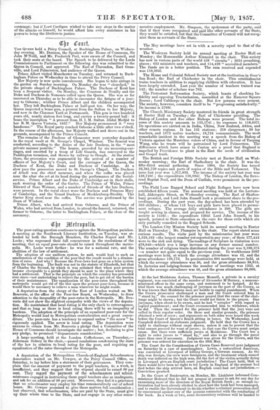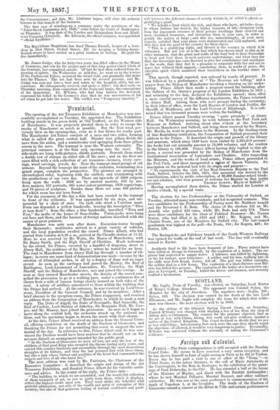aittrupplis.
The poor-rating question continues to agitate the Metropolitan parishes. A meeting at the Southwark Literary Institution, on Tuesday, was attended by both the Borough Members, Sir Charles Napier and Mr. Locke ; who expressed their full concurrence in the resolutions of the meeting, that an equal poor-rate should be raised throughout the metropolis. Mr. Locke went farther : he was for a national rate, and the abolition of the law of settlement.
The adoption of one uniform system, he said, would lead to such an amelioration of the condition of the poor that the result would be a diminution of rates. And why? Because the Poor-laws had gone on a false system from the beginning. The fault was not in the statute of Elizabeth, but that of Charles the Second, by which it was ordained that when poor persons became chargeeble to a parish they should be sent to the place where they had a settlement. That is the principle on which the country has proceeded ever sincenot undertaking to relieve the poor, but to get rid of the burden of their maintenance. The equalization of the poor-rates throughout the metropolis would get rid of the blot upon the present poor-laws, because it would then be necessary to relieve a man wherever he might reside.
• A deputation from the clergy of the East of London waited on Mr. Bouverie, at the office of the Poor-law Board, on Wednesday, to draw attention to the inequality of the poor-rates in the Metropolis. Mr. Bouverie did not show the slightest sympathy with the views of the deputation. He maintained that local rating is the only cheek to extravagance, and that so long as there is local rating there will be an inequality of burdens. The adoption of the principle of an equalized poor-rate for the Metropolis wad lead to Metropolitan centralization and a great expenditure. The poor-rate has a tendency to expand unless "the screw" be rigorously applied. The screw is local rating. The deputation were anxious to obtain from Mr. Bouverie a pledge that a Committee of the House of Commons should investigate the matter ; but, declining to give any pledge, he promised "dispassionate consideration."
A large meeting, held at the London Coffeehouse, on Thursday,— Alderman Sidney in the chair —passed resolutions condemning the state of the law in relation to local rating for the poor, and requiring an equalization of the rates throughout the Metropolis.
A deputation of the Metropolitan Church-of-England Schoolmasters Association waited on Mr. Cowper, at the Privy Council Office, on Saturday, to lay before him a statement of their grievances. They complain that the amount of payment to the pupil teachers, 48. a week, is insufficient, and they suggest that the stipend should be raised 50 per cent. They regard the payment of the schoolmasters and schoolmistresses engaged in instructing these pupil, teachers also as inadequate, and ask for an addition-of 50 per cent. Moreover, they feel it a grievance that no schoolmaster may employ his time remuneratively out of school hours. Mr. Cowper promised to give these matters full consideration ; but observed, that schoolmasters, who are paid by the State, must give up their whole time to the State, and not engage in any other remu nerative employment. Mr. Simpson, the spokesman of the party., said that if they were recognized and paid like other servants of the State, they would be satisfied, but that the Committee of Council will not recognize them as servants of the State.
The May meetings have set in with a severity equal to that of the weather.
The Wesleyan Society held its annual meeting at Exeter Hall on Monday ; the Honourable Arthur Kinnaird in the chair. This society has now in various parts of the world 458 " circuits" •' 3624 preaching, places ; 632 ministers and teachers, and 114,428 "accredited members." The funds are in a better position. The sum received and expended was 119,205/.
The Home and Colonial School Society met at the institution in Gray's Inn Road ; the Earl of Chichester in the chair., This establishment trains teachers in addition to supplying children with education. It has been largely extended. Last year the number of teachers trained was 142; the number of scholars was 702.
The Protestant Reformation Society, which boasts of checking Infidelity and opposing Tractarianism, assembled at the Hanover Square Rooms ; Lord Calthorpe in the chair. But few persons were present. The society, however, considers itself to be "progressing satisfactorily." Its income is 2798/.
The Church Missionary Society mustered its friends in great strenxtb. at Exeter Hall on Tuesday; the Earl of Chichester presiding. The Bishop of London and five other Bishops were present. The total income of this society amounts to 123,174/. ; its expenses to 118,657/. Its operations are carried on in India, China, New Zealand, Africa, and other remote regions. It has 131 stations; 218 clergymen ; 50 lay teachers, and 1872 native teachers ; 18,724 communicants. The most remarkable incident in the meeting was a speech from the Bishop of Victoria against the Mantchoo rulers of China, and in favour of Taeping Wang, who he trusts will be patronized by Lord Palmerston. The differences which have arisen in Canton are a proof that England is impelled by Providence to plant in the East the seeds of civilization and Gospel truth.
The British and Foreign Bible Society met at Exeter Hall on Wednesday morning ; the Earl of Shaftesbury in the chair. It was the fifty-third annual gathering. Since 1804, the Society has issued 32,381,759 copies and parts of copies of the Bible and Testament. The issue last year was 1,517,853. The income of the society last year was 138,7491.; the expenditure 138,985/. The Bishop of London, the Reverend Baptist Noel, and the Dean of Carlisle, were prominent in the proceedings.
The Field Lane Ragged School and Night Refuges have now been established fifteen years. The annual meeting was held at the Lecturehall, Aldersgate Street., on Wednesday evening. The Earl of Shaftesbury presided, and Lord John Russell took a prominent share in the proceedings. During the past year, the day-school has been attended by 563 children ; of whom 143 boys and girls have been placed in permanent refuges. The average daily attendance is 290. The girls are taught sewing in classes, and prepared for service. The income of the society is 14461.; the expenditure 1264/. Lord John Russell, in his speech, pointed to State education as the cure for those evils which are only partially remedied in the Ragged Schools.
The London City Mission Society held its annual meeting in Exeter Hall on Thursday ; Mr. Plumptis in the chair. The report stated some curious results. The visits paid by the missionaries last year were 1,528,162 —the largest number yet reportedin any year ; of these 177,443 were to the sick and dying. The readings of Scripture in visitation were 478,049—which was a large increase on any former annual number. The number of religious tracts distributed during the year was 2,109,375 —a number not quite equal to the previous year. In workhouses 3087 meetings were held, at which the average attendance was 42, and the gross attendance 130,775. In penitentiaries 694 meetings were held, at which the average attendance was 56, and the gross attendance 38,815. In factories and lodging-houses the number of meetings was 1325, at which the average attendance was 46, and the gross attendance 60,606.
At the last Maidstone Assizes, Thomas Mansell, a private in a cavalry regiment, was convicted of the murder of Alexander M‘Burney, a noncommissioned officer in the same corps, and sentenced to be hanged. At the trial there was much challenging of jurymen on the part of the Crown, as it was known that Maidstone men are hostile to capital punishment. When the Crown prosecutor challenged a man and the Court ordered him to "stand by," the counsel for the prisoner prayed that the cause of the challenge might be shown ; but the Court would not listen to the prayer. One juryman, when about to be sworn, said he had "scruples" with regard to capital punishment; and the Court recommended him to withdraw, which he did. Then the counsel for the prisoner held that the jury were not called in their regular order. On these and similar grounds, the prisoner obtained a writ of error; and arguments on both sides were heard this week before the Court of Queen's Bench sitting in banco. On Wednesday, Lord Campbell delivered an elaborate judgment. He held that the Crown has a right to challenge without cause shown, unless it can be proved that the trial cannot proceed for want of jurors ; in that case the Crown must assign cause. But there were sufficient jurors at Maidstone. The Court has a right to order jurors to "stand by," and also to go through the panel more than once if necessary. Judgment was given for the Crown, and the prisoner was ordered for execution on the 18th May.
The Court for the Consideration of Crown Cases Reserved gave judgment on Saturday in a case of manslaughter. Lewis, a naturalized American, was convicted at Liverpool of killing George, a German seaman. As the ship was foreign, the crew were foreigners, and the treatment which caused death was inflicted on the high seas, did the fact of the victim actually dying in Liverpool give-an English court jurisdiction ? The Court held, that as there would have been no right to try Lewis in England if the seaman had died before the ship arrived here, an English court had not jurisdiction.— Conviction quashed.
In the Court of Bankruptcy, on Monday, Mr. Einklater informed Commissioner Holroyd that he did not propose at present to ask for any day for examining more of the directors of the Royal British Bank ; as enough information had been already elicited to show how the bank had been managed, and to enable the Government to decide whether a criminal prosecution shall be commenced against any of the persons connected. with the conducting of the bank. In a week or two, some documentary evidence will be handed to
the Commissioner; sad this, Mr. Linklater hopes, will close his arduous labours in this brawh of the business.
The first case af winding-up a company under the provisions of the "Joint-Stock Companies Act, 1856," came before the Court of Bankruptcy on Thursday. 71 was that of the London and Birminghtun Iron and Hardware Company (Limited). Mr. Edwards, the official assignee, was appointed "official liquidator."
The Marj-lebone Magistrate has fined Thomas Russell, keeper of a beershop in Bird Street, Oxford Street, 25/. for keeping a betting-house. Russell seems to have carried on a great business in betting. He paid the fine immediately.
Mr. James Gudge, who for forty-two years has filled offices in the House of Commons, and was for the greater part of that long period Chief Clerk of the Journals, has committed suicide. Of late he had often suffered from depression of spirits. On Wednesday at mid-day, he went on to the terrace of the Parliament Palace, mounted the dwarf wall, and gradually slid down into the Thames. The act had been seen by several persons, and Mr. Gudge was soon got into a boat and taken to the hospital, alive, but unconscious. Ile subsequently revived, and spoke a little ; but died early on Thursday morning, from congestion of the brain and lungs, the consequence of the immersion. Dr. }Kann, who had long known the deceased, expressed his belief to the Coroner's Jury that he was unconscious of his act when he got into the water. The verdict was "Temporary insanity."



























 Previous page
Previous page